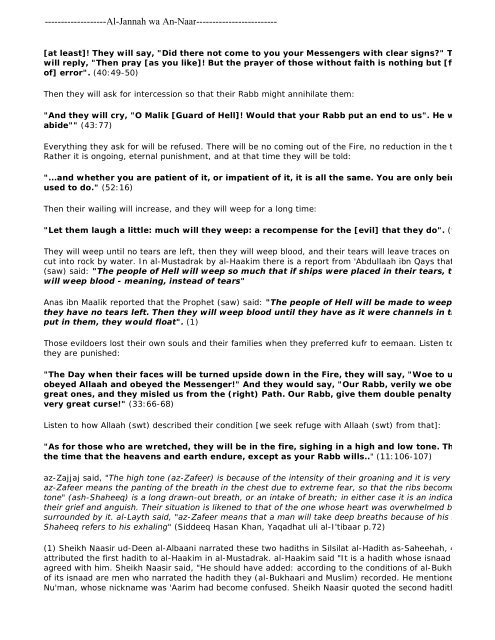You also want an ePaper? Increase the reach of your titles
YUMPU automatically turns print PDFs into web optimized ePapers that Google loves.
-------------------Al-Jannah wa An-Naar-------------------------<br />
[at least]! They will say, "Did there not come to you your Messengers with clear signs?" They will s<br />
will reply, "Then pray [as you like]! But the prayer of those without faith is nothing but [futile w<strong>and</strong><br />
of] error". (40:49-50)<br />
Then they will ask for intercession so that their Rabb might annihilate them:<br />
"And they will cry, "O Malik [Guard of <strong>Hell</strong>]! Would that your Rabb put an end to us". He will say, "N<br />
abide"" (43:77)<br />
Everything they ask for will be refused. There will be no coming out of the Fire, no reduction in the torment, an<br />
Rather it is ongoing, eternal punishment, <strong>and</strong> at that time they will be told:<br />
"...<strong>and</strong> whether you are patient of it, or impatient of it, it is all the same. You are only being requite<br />
used to do." (52:16)<br />
Then their wailing will increase, <strong>and</strong> they will weep for a long time:<br />
"Let them laugh a little: much will they weep: a recompense for the [evil] that they do". (9:82)<br />
They will weep until no tears are left, then they will weep blood, <strong>and</strong> their tears will leave traces on their faces<br />
cut into rock by water. In al-Mustadrak by al-Haakim there is a report from 'Abdullaah ibn Qays that the Messe<br />
(saw) said: "The people of <strong>Hell</strong> will weep so much that if ships were placed in their tears, they would<br />
will weep blood - meaning, instead of tears"<br />
Anas ibn Maalik reported that the Prophet (saw) said: "The people of <strong>Hell</strong> will be made to weep, <strong>and</strong> they<br />
they have no tears left. Then they will weep blood until they have as it were channels in their faces<br />
put in them, they would float". (1)<br />
Those evildoers lost their own souls <strong>and</strong> their families when they preferred kufr to eemaan. Listen to the wailin<br />
they are punished:<br />
"The Day when their faces will be turned upside down in the Fire, they will say, "Woe to us! Would<br />
obeyed Allaah <strong>and</strong> obeyed the Messenger!" And they would say, "Our Rabb, verily we obeyed our ch<br />
great ones, <strong>and</strong> they misled us from the (right) Path. Our Rabb, give them double penalty <strong>and</strong> curse<br />
very great curse!" (33:66-68)<br />
Listen to how Allaah (swt) described their condition [we seek refuge with Allaah (swt) from that]:<br />
"As for those who are wretched, they will be in the fire, sighing in a high <strong>and</strong> low tone. They will dw<br />
the time that the heavens <strong>and</strong> earth endure, except as your Rabb wills.." (11:106-107)<br />
az-Zajjaj said, "The high tone (az-Zafeer) is because of the intensity of their groaning <strong>and</strong> it is very high. It wa<br />
az-Zafeer means the panting of the breath in the chest due to extreme fear, so that the ribs become swollen. T<br />
tone" (ash-Shaheeq) is a long drawn-out breath, or an intake of breath; in either case it is an indication of the<br />
their grief <strong>and</strong> anguish. Their situation is likened to that of the one whose heart was overwhelmed by heat <strong>and</strong><br />
surrounded by it. al-Layth said, "az-Zafeer means that a man will take deep breaths because of his intense grie<br />
Shaheeq refers to his exhaling" (Siddeeq Hasan Khan, Yaqadhat uli al-I'tibaar p.72)<br />
(1) Sheikh Naasir ud-Deen al-Albaani narrated these two hadiths in Silsilat al-Hadith as-Saheehah, 4/245, no.<br />
attributed the first hadith to al-Haakim in al-Mustadrak. al-Haakim said "It is a hadith whose isnaad is saheeh"<br />
agreed with him. Sheikh Naasir said, "He should have added: according to the conditions of al-Bukhaari <strong>and</strong> M<br />
of its isnaad are men who narrated the hadith they (al-Bukhaari <strong>and</strong> Muslim) recorded. He mentioned that one<br />
Nu'man, whose nickname was 'Aarim had become confused. Sheikh Naasir quoted the second hadith in suppor














